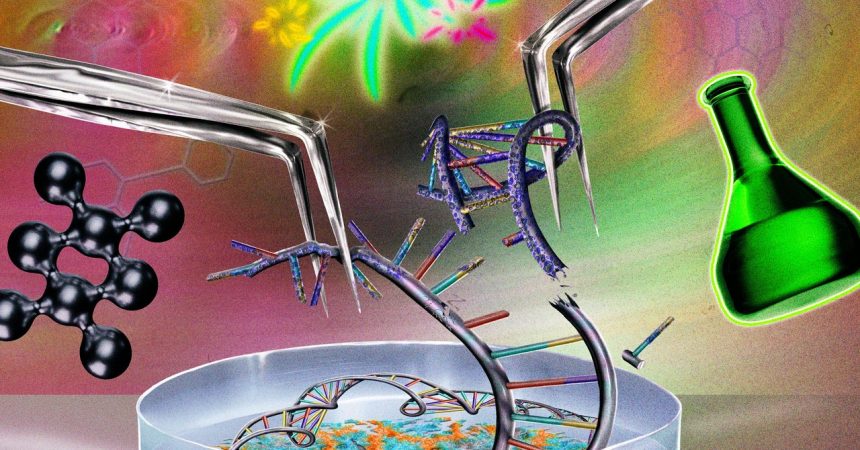Deshawn “DJ” Chow, a 19-year-old burdened by sickle cell disease since birth, embarked on a groundbreaking medical journey, becoming one of the first individuals in the United States to receive Casgevy, a revolutionary gene-editing therapy. Sickle cell disease, a debilitating condition affecting approximately 100,000 Americans, predominantly of African descent, causes red blood cells to assume a distorted, crescent shape, leading to blockages in blood vessels and excruciating pain crises. For Chow, the escalating frequency and intensity of these pain episodes disrupted his life, forcing him to miss school, social events, and cherished moments with friends. The promise of Casgevy offered a beacon of hope, a chance to finally break free from the relentless grip of pain.
Casgevy represents a paradigm shift in sickle cell treatment, harnessing the power of CRISPR, the Nobel Prize-winning gene-editing technology. Unlike previous treatments that managed symptoms, Casgevy aims to address the root cause of the disease by modifying the patient’s own stem cells. This one-time therapy involves a complex and demanding process. First, stem cells are harvested from the patient. Then, using CRISPR technology, the cells are genetically modified to produce fetal hemoglobin, a type of hemoglobin typically present during fetal development, which helps prevent the formation of sickle-shaped cells. Finally, after the patient undergoes a grueling round of chemotherapy to prepare their bone marrow, the modified stem cells are infused back into their body. This allows the edited stem cells to take root and produce healthy red blood cells, potentially eliminating or significantly reducing the painful symptoms of sickle cell disease.
While Casgevy received FDA approval in December 2023 for sickle cell disease and in January 2024 for beta-thalassemia, a related blood disorder, its rollout has been slow and complex. This stems from several factors, including the intricate manufacturing process required for gene therapies, insurance coverage hurdles, and the extensive pre- and post-treatment care patients necessitate. The therapy involves a month-long hospital stay following the infusion of modified stem cells and requires close monitoring to manage potential side effects and ensure the successful engraftment of the new cells. These logistical challenges highlight the complexities of translating cutting-edge scientific breakthroughs into readily accessible treatments for patients.
The limited availability of Casgevy is reflected in the small number of patients treated thus far. A survey conducted by WIRED of 34 US hospitals authorized to administer Casgevy revealed that only two – City of Hope Cancer Center in Los Angeles and Children’s National Hospital in Washington, D.C. – had administered the treatment as of early 2025. Chow became City of Hope’s inaugural sickle cell patient to receive Casgevy, while Children’s National treated a beta-thalassemia patient. Several other authorized centers indicated they anticipated initiating Casgevy infusions in early 2025, suggesting a gradual expansion of access to this innovative therapy.
Chow’s treatment represents a significant milestone in the fight against sickle cell disease, offering a glimpse into the potential of gene editing to transform the lives of patients suffering from debilitating genetic conditions. His journey underscores both the promise and the challenges of bringing these complex and expensive therapies to those who need them. While the initial rollout of Casgevy has been slow, the experiences of early recipients like Chow provide valuable insights and pave the way for wider access to this potentially life-altering treatment. As manufacturing processes are refined, insurance coverage expands, and treatment protocols are optimized, the hope is that Casgevy and other gene therapies will become more readily available, offering a brighter future for individuals living with sickle cell disease and other genetic disorders.
The contrast between the promise of Casgevy and the reality of its limited availability highlights the ongoing struggle to bridge the gap between scientific innovation and patient access. While gene editing holds immense potential to revolutionize medicine, the complexities of developing, manufacturing, and distributing these therapies present significant hurdles. The high cost of Casgevy, estimated at over $2 million per treatment, poses a substantial barrier for many patients, underscoring the need for innovative financing models and equitable access strategies. The experience of patients like Chow emphasizes the urgent need to address these challenges so that the transformative potential of gene editing can be realized for all who stand to benefit. As more patients receive Casgevy and other gene therapies, the data collected will be crucial in assessing long-term efficacy, safety, and cost-effectiveness, further informing the development and implementation of these groundbreaking treatments.



